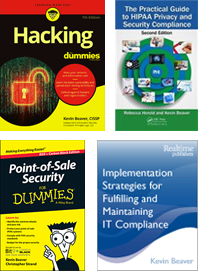-

Think computer security is not a business issue – just ask the FBI
12 Nov 2008Here’s an interesting tidbit from the Atlanta InfraGard’s CounterIntelligence Working Group web site reminding us that information security IS a business problem. Too many executives think this kind of stuff won’t happen to them:
“The Issue … Does your company have products or technology that someone might want to steal from you? … If a new competitor suddenly sprang up in the marketplace with exact copies of your products and was selling them for significantly less than yours, what would you do? … How would you respond? … Could your business survive this type of loss or illicit competition? Are you aware of the risks and threats your company faces in today’s global economy? Whether your company is big or small – whether you are the CEO, chairman or charged with security for your company, this is one meeting you do not want to miss.
Think it can’t happen to you or your company? Come hear Brett Kingstone, author of The Real War Against America describe a real life story of international intrigue. Kingstone, founder of Super Vision International, will tell his story of a desperate struggle against his former Chinese distributor who stole designs, equipment and profits. When Kingstone learned that the market had been flooded with knock off Super Vision products, he began immediately fighting to protect the business he started as a 19-year-old Stanford student. With the help of private investigators posing as rich Arab sheiks, Kingstone gathered evidence to take the criminals to civil court. But the defendants along with their lawyers and bankers went to extremes to cover their crimes and ill-gotten gains. In 2002, Super Vision won a $33 million verdict against the intellectual-property thieves, but has yet to see a dime. One expert testified that the defendants wired $28.5 million out of the U.S. before the trial “using methods consistent with money laundering.”
Our country’s challenge: Protect U.S. private sector companies’ sensitive information and technologies, and thereby competitiveness in an age of globalization. It is a non-traditional, “asymmetrical threat” that you must develop safeguards against—but you’re not alone. The FBI and other government agencies are not only aware of the these risks to Fortune 50,0000 companies, but have programs to brief you on new risks that you need to be aware of and actions to think about in today’s global economy.
Hear the solution: The U.S. is the world’s leader in business innovation. Consider the breakthrough research and business innovation that’s taking place in U.S. companies. Sensitive work, most of which occurs in the unclassified realm, is the key to our nation’s global advantage economically, militarily and intellectually. The FBI is working to communicate and build awareness through partnerships with public and private entities by educating and enabling our partners to identify what is at risk and how to protect it. We call it “knowing your domain”—identifying the research, information and technologies that are targeted by our adversaries and establishing an ongoing dialogue and information exchange with partners to change behaviors and reduce opportunities that benefit the opposition’s efforts. The FBI’s Counterintelligence (CI) Domain Program is responsible for determining and safeguarding those technologies and business practices which, if compromised, would result in losses to our national or economic security. Through our partnerships with businesses, academia, and U.S. government agencies, the FBI and its intelligence community partners are able to identify and effectively protect projects of great importance to the U.S. This provides the first line of defense inside entities where foreign intelligence services are focused.“



